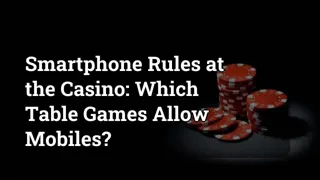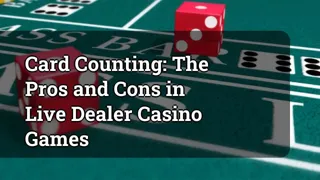Beginner's Luck: The Myth of Winning Big on Your First Casino Visit

The Myth of Winning Big on Your First Casino Visit
Have you ever heard the phrase "beginner's luck"? It's a common belief that people who visit a casino for the first time are more likely to win big. The idea is that casinos want to entice new players by letting them win initially, thus hooking them into a lifetime of gambling. But is there any truth to this notion? Do casinos really let you win at first? Let's explore this myth and separate fact from fiction.
The House Always Has the Advantage
First and foremost, it's important to understand that casinos are businesses. And like any business, their ultimate goal is to make a profit. Casinos are designed to have a mathematical edge in every game they offer, ensuring that over time, they will always come out on top. This is commonly referred to as "the house edge."
Whether it's slot machines, blackjack, roulette, or any other game, the odds are always stacked in favor of the casino. This means that, in the long run, players are more likely to lose than win. While some individuals may experience short-term success, it's crucial to remember that it's just that - short-term luck.
The Role of Randomness
Another important factor to consider is the role of randomness in casino games. Most games of chance, such as slot machines or roulette, rely on random number generators (RNGs) to determine the outcome. These RNGs ensure that each spin of the wheel or roll of the dice is completely independent and unpredictable.
While it's true that someone could win a large sum of money on their first visit to a casino, it's purely a result of chance. The outcome is not influenced by the casino's desire to let new players win. It's simply luck being in the right place at the right time.
Marketing and Player Acquisition
While casinos may not intentionally let you win on your first visit, they do invest in marketing strategies to attract new players. They may offer enticing promotions, such as sign-up bonuses or free play, to encourage people to give their establishment a try. These marketing tactics are aimed at increasing player acquisition and creating a positive first impression.
However, it's crucial to remember that these promotions are not guarantees of winning. They are designed to give players a taste of the excitement and entertainment that casinos offer. Winning or losing is ultimately up to chance and individual luck.
Conclusion
While the idea of beginner's luck may be appealing, it's important to understand that casinos are not in the business of letting players win consistently. The house always has the advantage, and casino games are designed to be unpredictable and based on chance. Winning big on your first casino visit may happen, but it's not due to any intentional action by the casino. It's simply the result of luck, and the odds will always be in the casino's favor in the long run.
So, if you're planning a trip to a casino for the first time, enjoy the experience, but remember to approach gambling with caution and set limits for yourself. After all, the thrill of playing should be the main focus, rather than the expectation of winning big.











